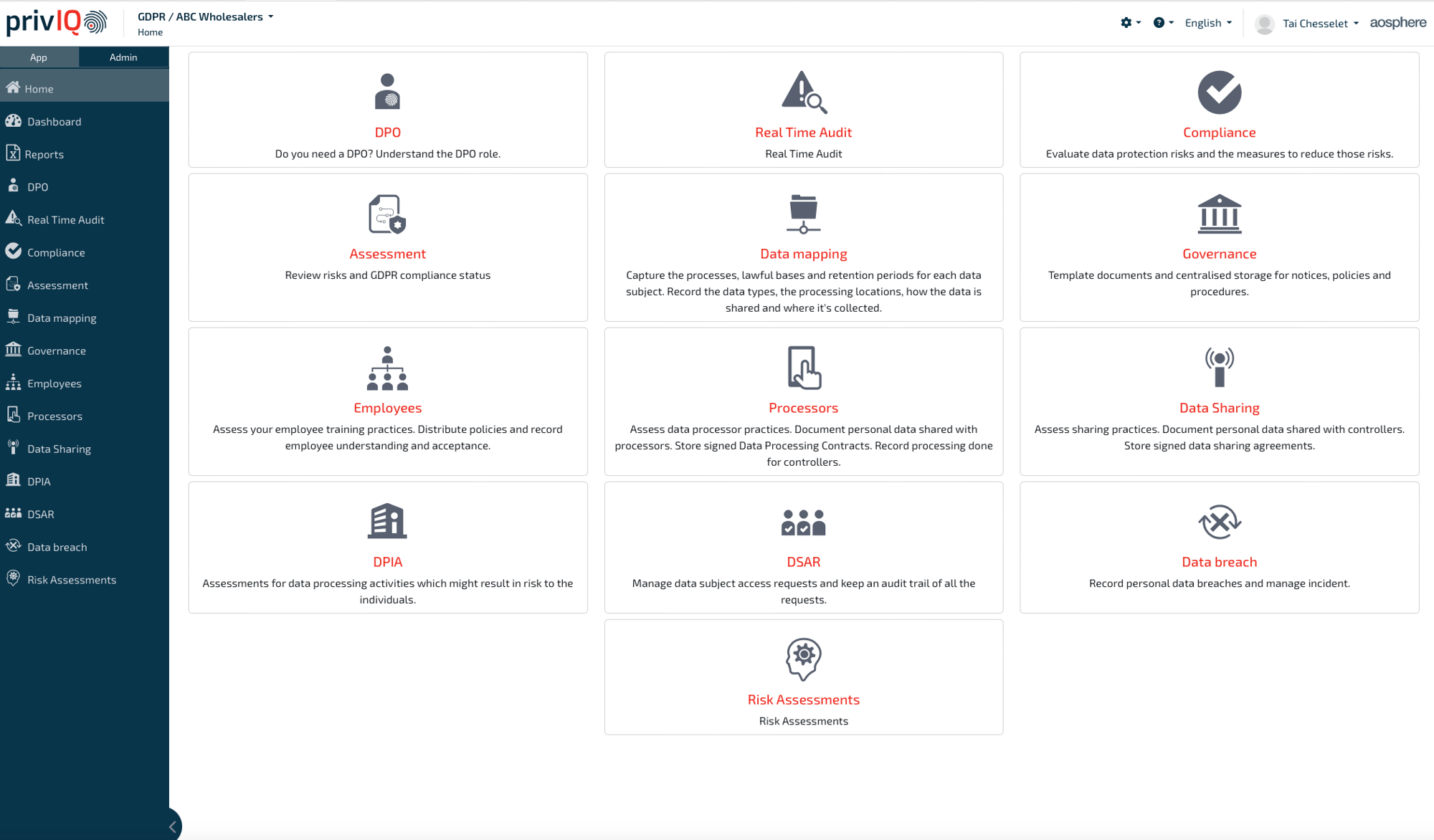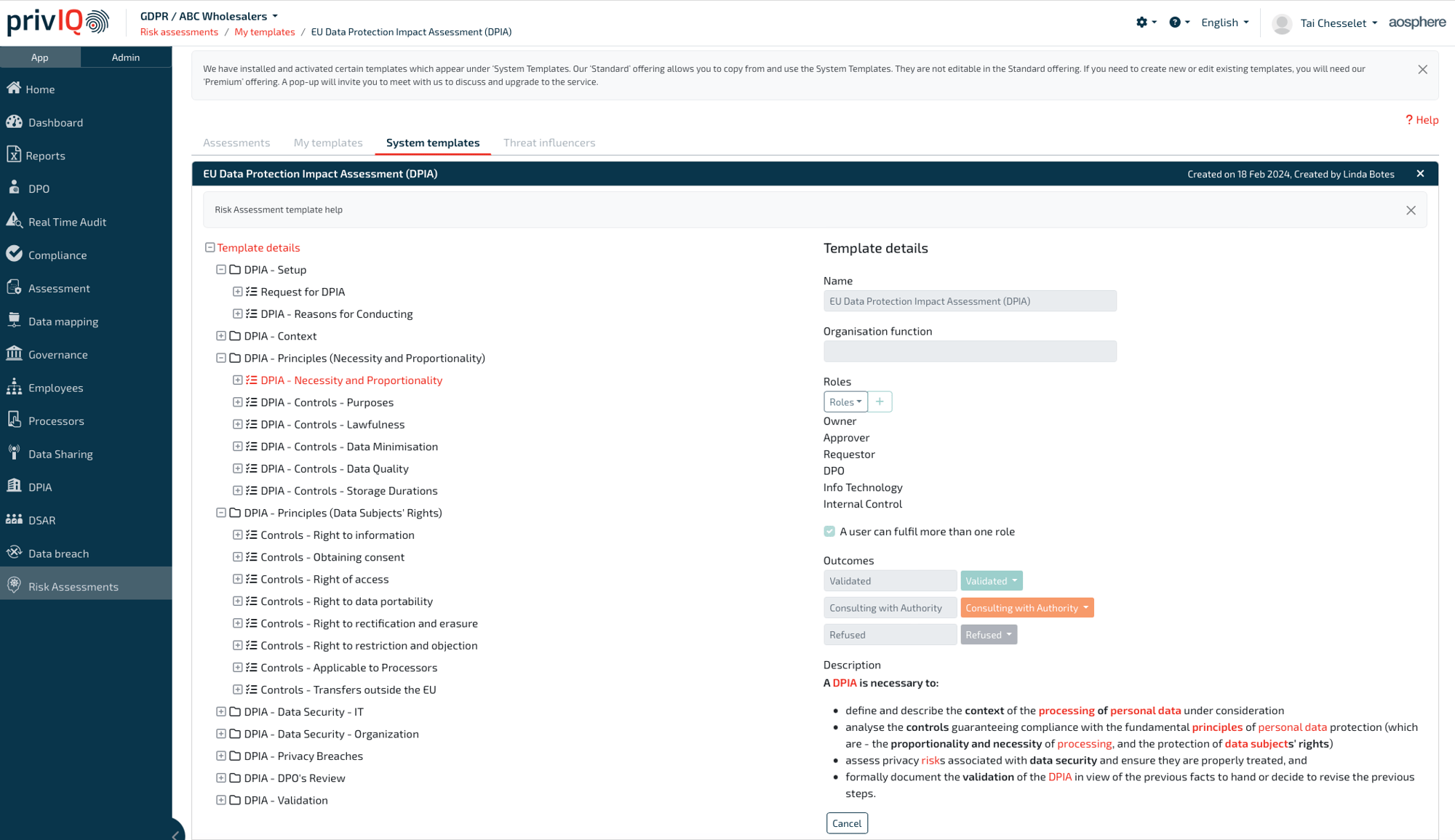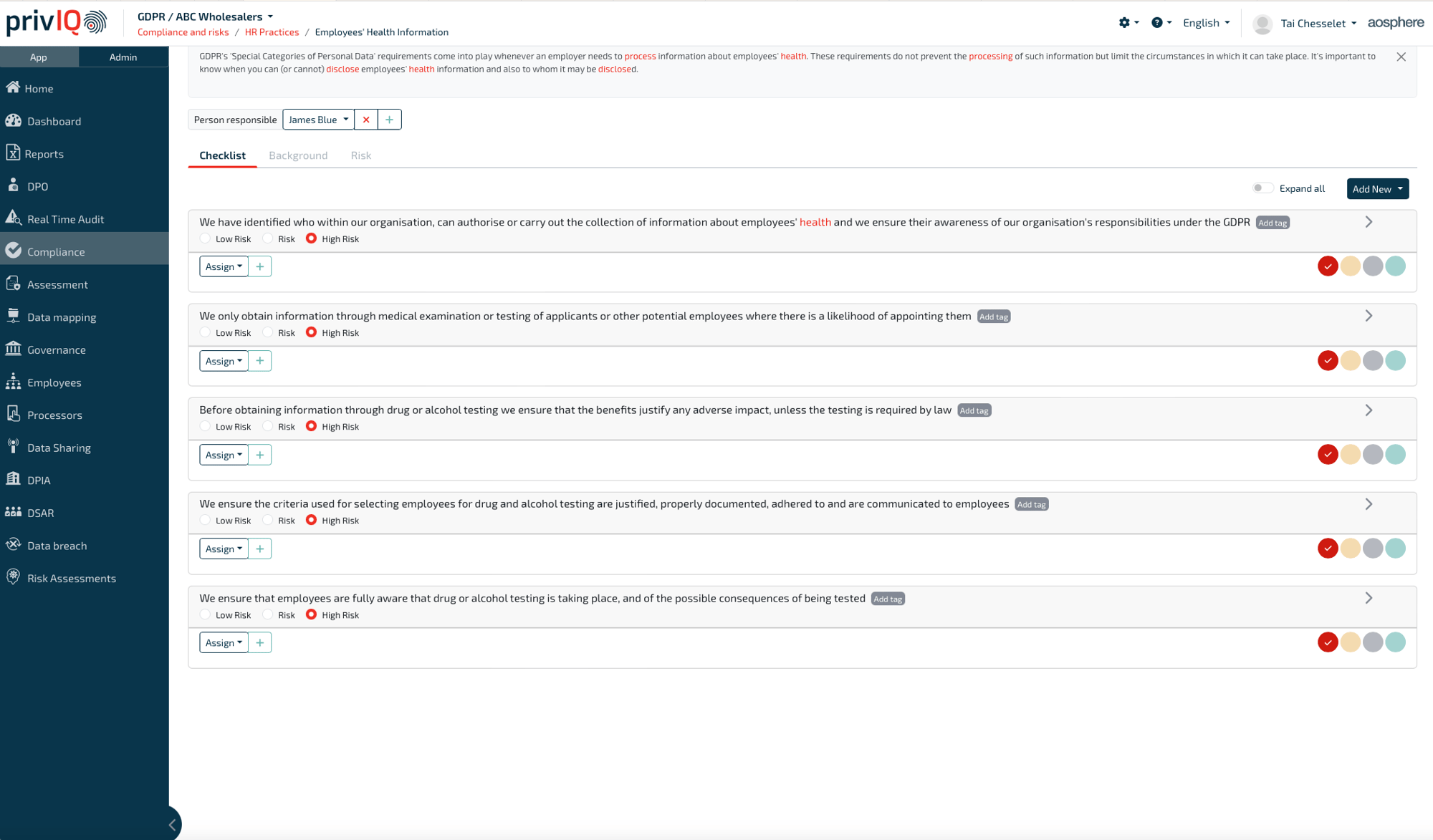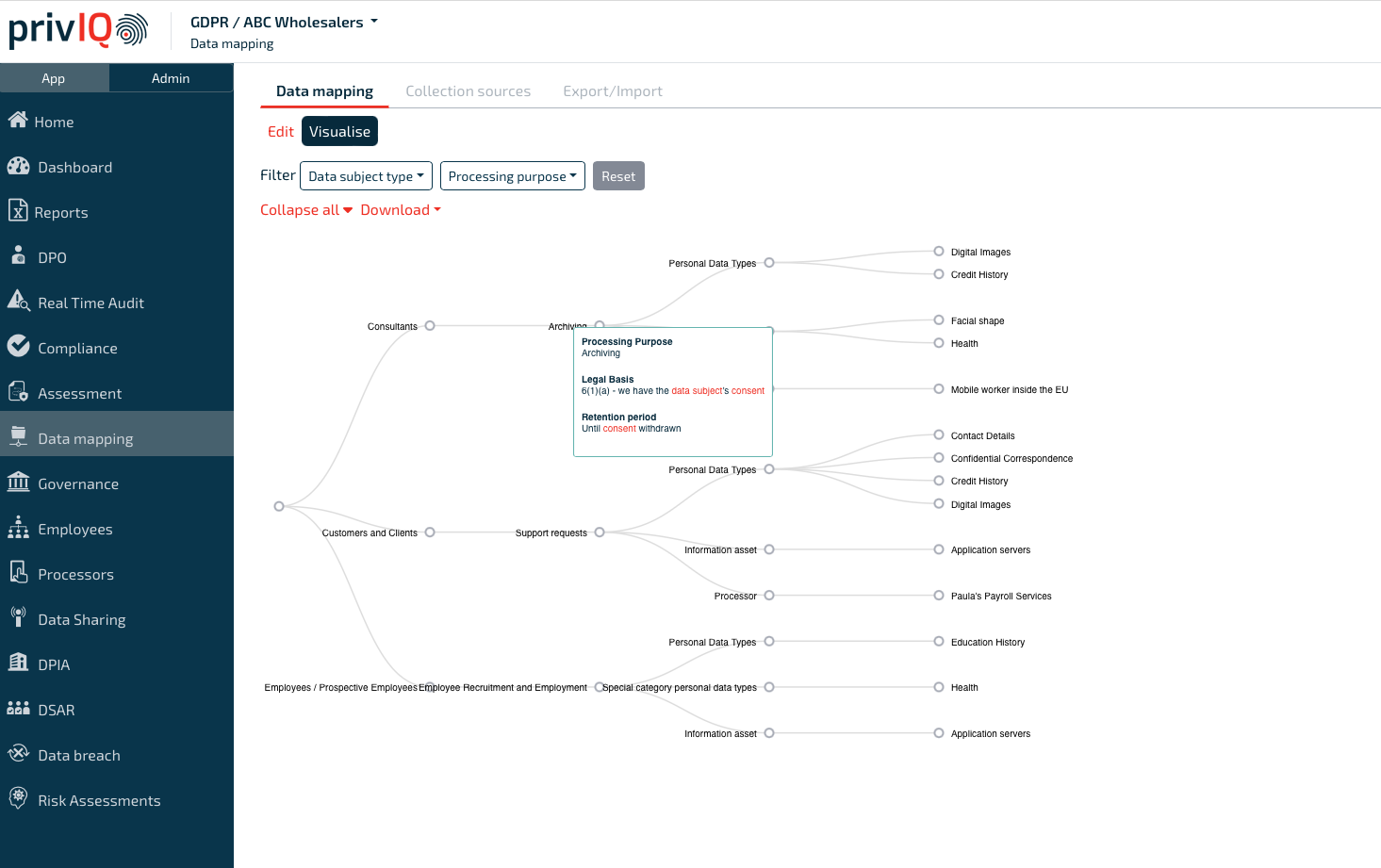Multi-regulation, multi-lingual data privacy
Data Privacy Risk Management from SME to Enterprise.
Consultant and Practitioner friendly.

11
Regulations
+Global
Version
AI-Assisted
Yes
We get your headspace


Demonstrate Compliance.
Data privacy management requires a comprehensive approach across HR, IT & Security, and Marketing. Our solution helps you navigate data privacy regulations, ensuring adherence to standards, mitigating risks, and enhancing transparency and accountability. Monitor and enforce data privacy standards effectively and respond promptly to discrepancies.
Our platform provides thorough data mapping, offering a clear overview of data flows within your organization enabling your ROPA and Privacy Notices and identifying vendors.
Governance is at the heart of our solution. Manage privacy notices, policies, and stakeholder communications seamlessly, maintaining robust data privacy practices.
Manage third-party vendors and processors with ease. Monitor and assess their data privacy practices to ensure compliance with your standards and regulatory requirements.
Conduct comprehensive risk assessments, including DPIA and TIA, among others. Identify and mitigate potential privacy risks, ensuring compliant data handling practices.
Handle DSARs and data breach reporting efficiently. Streamline these processes to ensure timely and accurate responses to regulatory requirements.
A solution you can tailor to your requirements.
Data Privacy Risk Assessments.
Our Data Privacy Risk Assessment module ensures compliance with requirements like DPIA and TIA. In addition it allows you to assess and monitor the data privacy practices of third-party vendors and processors, ensuring they meet regulatory standards.
Beyond statutory assessments, our module includes AI use risk management. As AI adoption grows, it’s vital to mitigate privacy risks associated with AI technologies. Our risk assessments allow you to evaluate these risks, ensuring responsible AI use and regulatory compliance.
A standout feature is the flexibility of our AI-assisted, human-verified technology, allowing you to create custom risk assessments. This combination of AI efficiency and human insight ensures comprehensive and accurate risk assessments, tailored to your specific needs.
Stay ahead of potential threats and maintain clear data privacy practices with our versatile module.


Operational HR, IT & Security and Marketing compliance.
Our Operational Compliance module simplifies data privacy compliance across HR, IT & Security, and Marketing. It provides comprehensive checklists tailored to each department’s specific needs, ensuring that all areas of your organization meet regulatory requirements. By breaking down compliance tasks into manageable steps, our module helps departments maintain a clear focus on their responsibilities.
The module includes assignable tasks, enabling teams to collaborate effectively. Each task is clearly defined and can be assigned to specific team members, ensuring accountability and streamlined workflows. This collaborative approach fosters a culture of shared responsibility and ensures that compliance efforts are coordinated across departments.
Risk reports generated by our module offer insights into compliance status and highlight areas needing attention. These reports enable proactive risk management, allowing departments to address potential issues before they become critical. With our Operational Compliance module, your organization can achieve and maintain compliance efficiently and collaboratively.
Data Mapping.
Our Data Mapping module enables the visualizing data flows within your organization. It allows data mapping by department, processing purpose, and data subject type, giving you a detailed understanding of how data is handled across your operations. This granularity ensures that all aspects of data processing are transparent and easily manageable.
With built-in identification of vendors and features for conducting Legitimate Interest Assessments (LIA) and determining lawful bases for processing, our module provides a complete data mapping service. This functionality helps ensure compliance with data privacy regulations by clearly outlining the relationships and purposes for data processing activities.
The module also facilitates the generation of essential documents such as Privacy Notices, Records of Processing Activities (ROPA), and vendor/processor contracts. Additionally, it provides critical information for conducting Data Protection Impact Assessments (DPIAs).
By streamlining these processes, our Data Mapping module enables efficient compliance management and supports your organization in maintaining data privacy practices.

Regulations we cover
GDPR - EU
The GDPR (General Data Protection Regulation) is a set of regulations designed to give EU citizens greater control over their personal data, including how it's collected, used, and shared. It also puts in place more stringent rules for how companies must handle data breaches and gives individuals the right to request that their data be deleted.
GDPR - UK
The UK GDPR is a set of data privacy regulations based on the EU GDPR, with some additional provisions specific to the UK. It gives UK citizens greater control over their personal data and gives them the right to request that their data be deleted. It also requires businesses to take reasonable steps to protect personal data and to notify individuals in the event of a data breach.
Data Privacy - USA
Our USA platforms are an integrated suite of tools to deliver data privacy intelligence & risk management, so you can concentrate on your mission without the burdens of documenting and maintaining legal compliance.
CCPA - California
The California Consumer Privacy Act (CCPA) is a data privacy law that gives California residents more control over their personal information, including the right to request that their data be deleted. The CCPA also requires businesses to be transparent about how they collect, use, and share personal data, and it places limits on the sale of personal data.
PDPL - Saudi Arabia
The PDPL serves as the cornerstone of personal data protection in the KSA. The PDPL, alongside its Implementing Regulations, aims to regulate the processing of personal data, ensuring the privacy and protection of individuals' rights.
LGPD - Brazil
The General Data Protection Law (LGPD) is a data privacy law that governs the processing of personal data in Brazil. It gives Brazilian citizens the right to access their personal data and request its deletion or correction. It also requires businesses to be transparent about their data processing practices and to obtain consent from individuals before collecting their data.
PDPA - Thailand
The Personal Data Protection Act (PDPA) is a data privacy law that protects the personal data of individuals in Singapore. It requires organizations to obtain consent before collecting personal data, and to take measures to protect the security of that data. The PDPA also gives individuals the right to access their data and request its deletion.
POPIA - South Africa
The Protection of Personal Information Act (POPIA) is a data privacy law in South Africa that grants the right of access and erasure to individuals. It also requires organizations to be transparent about how they collect and use personal data, and to implement security measures to protect that data. The POPIA also gives individuals the right to object to the processing of their data for direct marketing purposes.
NDPR - Nigeria
The Nigerian Data Protection Regulation (NDPR) is a data privacy law that protects the personal data of Nigerian citizens and residents. It requires organizations to obtain consent before collecting data, and to provide individuals with access to their data and the ability to request its deletion. The NDPR also requires organizations to implement security measures to protect personal data.
KVKK - Turkey
The KVKK is a data privacy law that aims to protect the personal data of Turkish citizens and residents. It gives individuals the right to request access to their data, to have their data deleted or corrected, and to object to the processing of their data. The KVKK also places restrictions on the processing of sensitive personal data, such as health data and financial data.
KDPA - Kenya
The Kenyan Data Protection Act (KDPA) is a data privacy law that grants the right of access and erasure to Kenyan citizens, as well as the right to be notified in the event of a data breach. The KDPA also requires organizations to implement technical and organizational measures to protect personal data.


It features transparent pricing without hidden costs and is highly customizable to meet specific organizational requirements.
I would like to
Take a free data privacy self assessment.
How ready is your organization? Do you have a comprehensive data privacy management program?
Register for a Free Data Privacy Gap Analysis
A Gap Analysis covering 12 areas of Data Privacy Management with the ability to review your assessment via detailed risk reports showing probability and impact, residual and inherent risks.